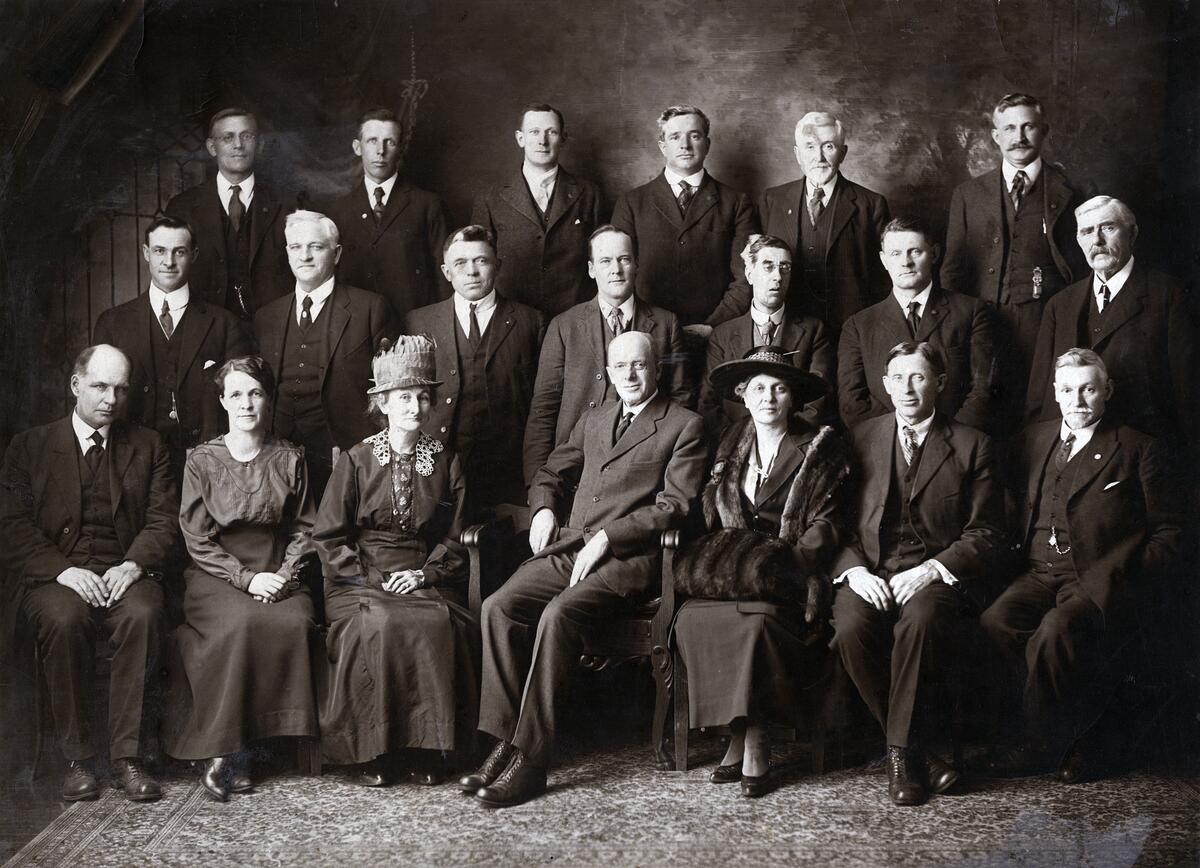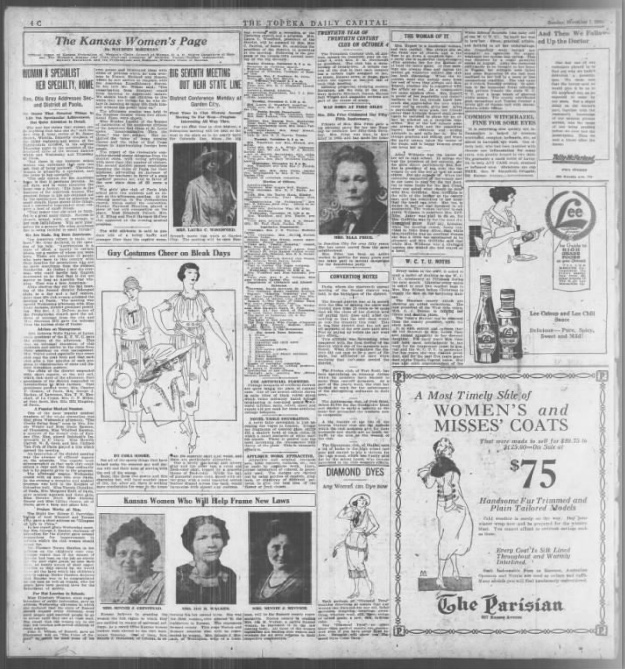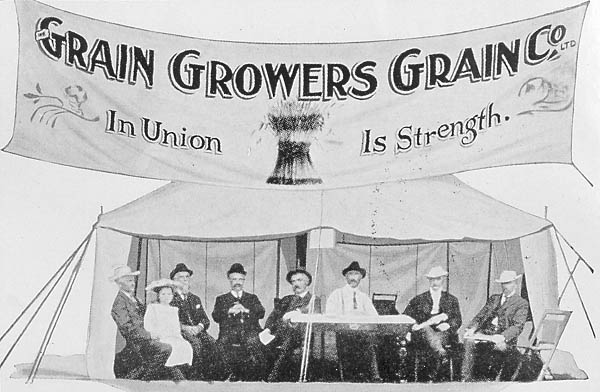|
The Grain Growers' Guide
''The Grain Growers' Guide'' (later called the ''Country Guide'') was a newspaper published by the Grain Growers' Grain Company (GGGC) in Western Canada for grain farmers between 1908 and 1936. It reflected the views of the grain growers' associations. In its day it had the highest circulation of any farm paper in the region. Foundation The agrarian activist Edward Alexander Partridge felt that the press had given unfair treatment of the struggle in 1906–07 to get the Grain Growers' Grain Company (GGGC) off the ground, and helped organize a farmers' publication. The first issue of ''The Grain Growers' Guide'' appeared in June 1908, as the official organ of the Manitoba Grain Growers' Association (MGGA). It was edited by Partridge. It was published by the Grain Growers' Grain Company through its subsidiary, Public Press Limited. History Partridge thought the guide should be a militant paper, but did not have support for this view from the co-founders. He resigned after the firs ... [...More Info...] [...Related Items...] OR: [Wikipedia] [Google] [Baidu] |
Grain Growers' Grain Company
The Grain Growers' Grain Company (GGGC) was a farmers' cooperative founded in the prairie provinces of western Canada in 1906. The GGGC met strong resistance from existing grain dealers. It was forced off the Winnipeg Grain Exchange and almost failed. With help from the Manitoba government it regained its seat on the exchange, and soon had a profitable grain trading business. The company founded the '' Grain Growers' Guide'', which became the most popular farmer's newspaper in the region. In 1912 the GGGC began operating inland and terminal grain elevators, and in 1913 moved into the farm supply business. The GGGC was financially secure and owned or operated almost 200 elevators as well as 122 coals sheds and 145 warehouses by the time it merged with the Alberta Farmers' Co-operative Elevator Company to form the United Grain Growers in 1917. Foundation The GGGC was largely the creation of the agrarian activist Edward Alexander Partridge, an "impetuous and idealistic" man. He was c ... [...More Info...] [...Related Items...] OR: [Wikipedia] [Google] [Baidu] |
Progressive Party Of Canada
The Progressive Party of Canada, formally the National Progressive Party, was a federal-level political party in Canada in the 1920s until 1930. It was linked with the provincial United Farmers parties in several provinces, and it spawned the Progressive Party of Saskatchewan, and the Progressive Party of Manitoba, which formed the government of that province. The Progressive Party was part of the farmers' political movement that included federal and provincial Progressive and United Farmers' parties. The United Farmers movement in Canada rose to prominence after World War I. With the failure of the wartime Union government to alter a tariff structure that hurt farmers, various farmers movements across Canada became more radical and entered the political arena. The United Farmers movement was tied to the federal Progressive Party of Canada and formed provincial governments in Ontario, Alberta and Manitoba. It rejected the National Policy of the Conservatives, and felt that th ... [...More Info...] [...Related Items...] OR: [Wikipedia] [Google] [Baidu] |
1936 Disestablishments In Canada
Events January–February * January 20 – George V of the United Kingdom and the British Dominions and Emperor of India, dies at his Sandringham Estate. The Prince of Wales succeeds to the throne of the United Kingdom as King Edward VIII. * January 28 – Britain's King George V state funeral takes place in London and Windsor. He is buried at St George's Chapel, Windsor Castle * February 4 – Radium E (bismuth-210) becomes the first radioactive element to be made synthetically. * February 6 – The 1936 Winter Olympics, IV Olympic Winter Games open in Garmisch-Partenkirchen, Germany. * February 10–February 19, 19 – Second Italo-Ethiopian War: Battle of Amba Aradam – Italian forces gain a decisive tactical victory, effectively neutralizing the army of the Ethiopian Empire. * February 16 – 1936 Spanish general election: The left-wing Popular Front (Spain), Popular Front coalition takes a majority. * February 26 – February 26 Inci ... [...More Info...] [...Related Items...] OR: [Wikipedia] [Google] [Baidu] |
1908 Establishments In Canada
Nineteen or 19 may refer to: * 19 (number), the natural number following 18 and preceding 20 * one of the years 19 BC, AD 19, 1919, 2019 Films * ''19'' (film), a 2001 Japanese film * ''Nineteen'' (film), a 1987 science fiction film Music * 19 (band), a Japanese pop music duo Albums * ''19'' (Adele album), 2008 * ''19'', a 2003 album by Alsou * ''19'', a 2006 album by Evan Yo * ''19'', a 2018 album by MHD * ''19'', one half of the double album ''63/19'' by Kool A.D. * ''Number Nineteen'', a 1971 album by American jazz pianist Mal Waldron * ''XIX'' (EP), a 2019 EP by 1the9 Songs * "19" (song), a 1985 song by British musician Paul Hardcastle. * "Nineteen", a song by Bad4Good from the 1992 album '' Refugee'' * "Nineteen", a song by Karma to Burn from the 2001 album ''Almost Heathen''. * "Nineteen" (song), a 2007 song by American singer Billy Ray Cyrus. * "Nineteen", a song by Tegan and Sara from the 2007 album '' The Con''. * "XIX" (song), a 2014 song by Slipknot. ... [...More Info...] [...Related Items...] OR: [Wikipedia] [Google] [Baidu] |
Social Feminist
Social feminism is a feminist movement that advocates for social rights and special accommodations for women. It was first used to describe members of the women's suffrage movement in the late nineteenth and early twentieth centuries who were concerned with social problems that affected women and children. They saw obtaining the vote mainly as a means to achieve their reform goals rather than a primary goal in itself. After women gained the right to vote, social feminism continued in the form of labor feminists who advocated for protectionist legislation and special benefits for women. The term is widely used, although some historians have questioned its validity. Origin of term William L. O'Neill introduced the term "social feminism" in his 1969 history of the feminist movement ''Everyone Was Brave: The Rise and Fall of Feminism in America''. He used the term to cover women involved in municipal civic reform, settlement houses and improving labor conditions for women and children ... [...More Info...] [...Related Items...] OR: [Wikipedia] [Google] [Baidu] |
Irene Parlby
Mary Irene Parlby ( Marryat; 9 January 186812 July 1965) was a Canadian women's farm leader, activist and politician. She served as Minister without portfolio in the Cabinet of Alberta from 1921 to 1935, working to implement social reforms that helped farm women and children. As a member of the Famous Five, she was one of five women who took the Persons Case first to the Supreme Court of Canada, and then to the British Judicial Committee of the Privy Council for the right of women to serve in the Senate of Canada. From 1930 to 1934, she was one of three Canadian representatives at the League of Nations in Geneva, Switzerland. Parlby's accomplishments have garnered her many honours, both before and after her death. In 1935, the University of Alberta granted her an honorary Doctorate of Laws, making her the first woman in its history to receive such a distinction. In 1966, a year after her death, she was named a Person of National Historic Significance, and in 2009, the Sen ... [...More Info...] [...Related Items...] OR: [Wikipedia] [Google] [Baidu] |
Nellie McClung
Nellie Letitia McClung (; 20 October 18731 September 1951) was a Canadian author, politician, and social activist, who is regarded as one of Canada's most prominent suffragists. She began her career in writing with the 1908 book ''Sowing Seeds in Danny'', and would eventually publish sixteen books, including two autobiographies. She played a leading role in the women's suffrage movement in Canada, helping to grant women the vote in Alberta and Manitoba in 1916. McClung was elected to the Legislative Assembly of Alberta in 1921, where she served until 1926. As a member of the Famous Five, she was one of five women who took the Persons Case first to the Supreme Court of Canada, and then to the Judicial Committee of the Privy Council, for the right of women to serve in the Senate of Canada. McClung was the first woman appointed to the board of the Canadian Broadcasting Corporation in 1936. She served as a delegate to the League of Nations in Geneva, Switzerland in 1938. Early ... [...More Info...] [...Related Items...] OR: [Wikipedia] [Google] [Baidu] |
Ella Cora Hind
Ella Cora Hind (September 18, 1861 – October 6, 1942) was a Canadian journalist, agriculturalist, Women's rights activist and suffragist. During the Great Depression, she became famous internationally for her accurate predictions of Canadian prairie crop yields. "Her predictions so regularly proved correct that grain handlers across the world came to rely on them." Early life E. Cora Hind was born in Toronto on September 18, 1861 to Edwin Hind and Jane Carroll. She was two years old when she lost her mother, and five years old when her father died. After the death of her mother, she and her older brothers Joseph and George moved to Artemisia Township to live with their paternal grandfather, Joseph Hind, and aunt Alice. Hind’s grandfather taught her about farming, horses, and cattle. Living several miles from school delayed her education until 1872 so Aunt Alice home-schooled her until the Province built a school on her grandfather’s land. Her family relocated to Fle ... [...More Info...] [...Related Items...] OR: [Wikipedia] [Google] [Baidu] |
Francis Marion Beynon
Francis Marion Beynon (26 May 1884 – 5 October 1951) was a Canadian journalist, feminist and pacifist. She is known for her semi-autobiographical novel ''Aleta Day'' (1919). Early years Francis Marion Beynon was born in Streetsville, Ontario on 26 May 1884. Her parents, James Barnes Benyon (1835–1907) and Rebecca (Manning) Beynon (1847–98), married in 1872. Both parents were teetotallers and convinced Methodists, a faith she would later reject. Her sister was author Lillian Beynon Thomas (1874–1961). Her family moved to Manitoba in 1889 when she was a child and took up farming in the Hartney district. She earned a teaching certificate and taught near Carman for some time. Activist Around 1909 Beynon and her sister moved to Winnipeg, where Francis found work in the advertising department of the T. Eaton Company, a department store. Both sisters were active in fighting for women's suffrage, changes to dower legislation and the right of women to homestead. From 1912 to 19 ... [...More Info...] [...Related Items...] OR: [Wikipedia] [Google] [Baidu] |
Woman's Page
The women's page (sometimes called home page or women's section) of a newspaper was a section devoted to covering news assumed to be of interest to women. Women's pages started out in the 19th century as society pages and eventually morphed into features sections in the 1970s. Although denigrated during much of that period, they had a significant impact on journalism and in their communities. History Early women's pages In 1835 '' New York Herald'' publisher James Gordon Bennett Jr., created the first newspaper society page. In the century's final two decades, a "motley assemblage" of stories presumed to be of interest to women began to be gathered together into a single section of newspapers in Britain, Canada, and the US. In the 1880s and 1890s, newspaper publishers such as Joseph Pulitzer started developing sections of their papers to attract women readers, who were of interest to advertisers. Industrialization had profoundly increased the number of branded consumer product ... [...More Info...] [...Related Items...] OR: [Wikipedia] [Google] [Baidu] |
Social Gospel
The Social Gospel is a social movement within Protestantism that aims to apply Christian ethics to social problems, especially issues of social justice such as economic inequality, poverty, alcoholism, crime, racial tensions, slums, unclean environment, child labor, lack of unionization, poor schools, and the dangers of war. It was most prominent in the early-20th-century United States and Canada. Theologically, the Social Gospelers sought to put into practice the Lord's Prayer ( Matthew 6:10): "Thy kingdom come, Thy will be done on earth as it is in heaven". They typically were postmillennialist; that is, they believed the Second Coming could not happen until humankind rid itself of social evils by human effort. The Social Gospel was more popular among clergy than laity. Its leaders were predominantly associated with the liberal wing of the progressive movement, and most were theologically liberal, although a few were also conservative when it came to their views on social i ... [...More Info...] [...Related Items...] OR: [Wikipedia] [Google] [Baidu] |
United Grain Growers
The United Grain Growers, or UGG, was a Canadian grain farmers' cooperative for grain storage and distribution that operated between 1917 and 2001. History In 1917, the Grain Growers' Grain Company (GGGC) merged with the Alberta Farmers' Co-operative Elevator Company, founded in 1913, to form the United Grain Growers (UGG), which provided grain marketing, handling and supply. UGG was active in grain sales, crop inputs and livestock production services. In 2001, UGG merged with Agricore to form Agricore United in a deal brokered by Archer Daniels Midland, a majority stakeholder in the new company.(2001"United Grain Growers and Agricore sprout merger," CBC News. Retrieved August 1, 2007. Gallery & locations Alberta British Columbia Manitoba Saskatchewan See a ...
|
.jpg)






